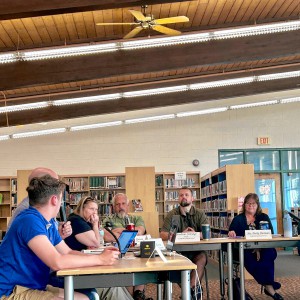Whitley launches exploratory committee for Congress

Becky Whitley
|
Published: 04-03-2024 4:25 PM
Modified: 04-04-2024 12:02 PM |
Becky Whitley gets the chills when she thinks back to introducing Senate Bill 175 last year, in front of the Health and Human Services Committee. It’s niche excitement for a routine hearing, but as Whitley talked through her “MomniBus” package – expanding Medicare coverage, lactation services, doula services and other support for women – it was her proudest professional day in the State House.
“I introduced it with my colleagues, shoulder to shoulder with other moms in the Senate,” said the Hopkinton Democrat. “It just felt emblematic of everything that I came to the State House to do.”
When Whitley first ran for State Senate in 2020, she knew she’d bring the voice of a working parent to the chamber floor. Now, that’s also driving her interest in the open seat for the second Congressional District in New Hampshire, after Rep. Annie Kuster announced she would not seek re-election last week.
“We also need that voice in Congress, right, fighting for New Hampshire families, someone who really understands,” she said.
Whitley hasn’t declared her candidacy yet. But on Wednesday she announced that she formed an exploratory committee, to look at a potential run.
Former Executive Councilor Colin Van Ostern, a Democrat, announced last week that he will run for Kuster’s seat.
Whitley’s news dropped right at 9 a.m. as she was in a Senate Health and Human Services committee meeting – hearing a slew of bills from child care licensing and staffing to how to define mental illness for state services.
“I was in Senate HHS making my $100,” she joked. “It never stops.”
Article continues after...
Yesterday's Most Read Articles
 Neighboring landowner objection stalls Steeplegate redevelopment approval
Neighboring landowner objection stalls Steeplegate redevelopment approval
 Lawyers and lawmakers assert the Department of Education is on the verge of violating the law
Lawyers and lawmakers assert the Department of Education is on the verge of violating the law
 Youth rally against New Hampshire’s bill allowing medical aid in dying
Youth rally against New Hampshire’s bill allowing medical aid in dying
 Body of long-missing hiker found, pinned by boulder in Dry River
Body of long-missing hiker found, pinned by boulder in Dry River
 UNH seeks vandal who accused university of genocide in spray-painted message
UNH seeks vandal who accused university of genocide in spray-painted message
 As site testing begins on new middle school site, activists file to put location debate on the ballot
As site testing begins on new middle school site, activists file to put location debate on the ballot
Prior to running for Senate, Whitley worked as a disability rights lawyer, climate activist and child policy specialist. While many candidates who announce exploratory committees go on to run for office, this intermediary step will allow her to start raising money and test polling messages. She does not have a timeline for an official decision, she said.
Whitley’s MomniBus package was ultimately included in the governor’s biennial budget, last year. It’s one of several successful policy packages she’s passed in support of working families, she said.
And these successes have come while serving in the Senate minority. The current divide of the chamber is 14 Republicans to 10 Democrats.
“I think it’s easy to be caught up in the culture wars and political game, but I’ve always stayed laser-focused on getting results and actually getting policies and actions that are going to improve people’s lives,” she said. “Wouldn’t it be amazing if that type of approach was also in Congress?”
The hallmark themes of Whitley’s Senate work – supporting working families, expanding access to reproductive rights, fighting food insecurity – are issues across the country, she said, that will be the pillars of her congressional campaign.
New Hampshire is currently on the frontlines against antiabortion activists, she said. The Granite State continues to be an outlier in New England, as the only state to not have affirmative protection for the procedure in state law.
And with a wide-open seat for the first time in over a decade, abortion, among other issues will drive national attention to the state’s second district. Whitley knows this, and said as a state senator she has already made national connection based on her policy issues that she hopes would support her candidacy.
“I’m already hearing from those national organizations that have been shoulder to shoulder with us here in New Hampshire to work on those policies,” she said.
Yet the crux of New Hampshire politics lies in local connections. Like Kuster, Whitley lives with her family in Hopkinton, where her son is in elementary school.
Before she formally announces a campaign, it’s neighbors and friends she is turning to for support, she said.
“I really take very seriously these conversations with my community, she said.
But she’s also quick to note that the state has a long tradition of sending female leaders to the Capitol. And as a working mom, that’d leave another mark on the state’s rich history.







 For the first time, education commissioner speaks publicly about minimum standards revision, but he faces skepticism
For the first time, education commissioner speaks publicly about minimum standards revision, but he faces skepticism Adam Montgomery sentenced to minimum 56 years on murder charges in young daughter’s death
Adam Montgomery sentenced to minimum 56 years on murder charges in young daughter’s death Following budget cut, Pembroke revisits future of elementary school re-build
Following budget cut, Pembroke revisits future of elementary school re-build
